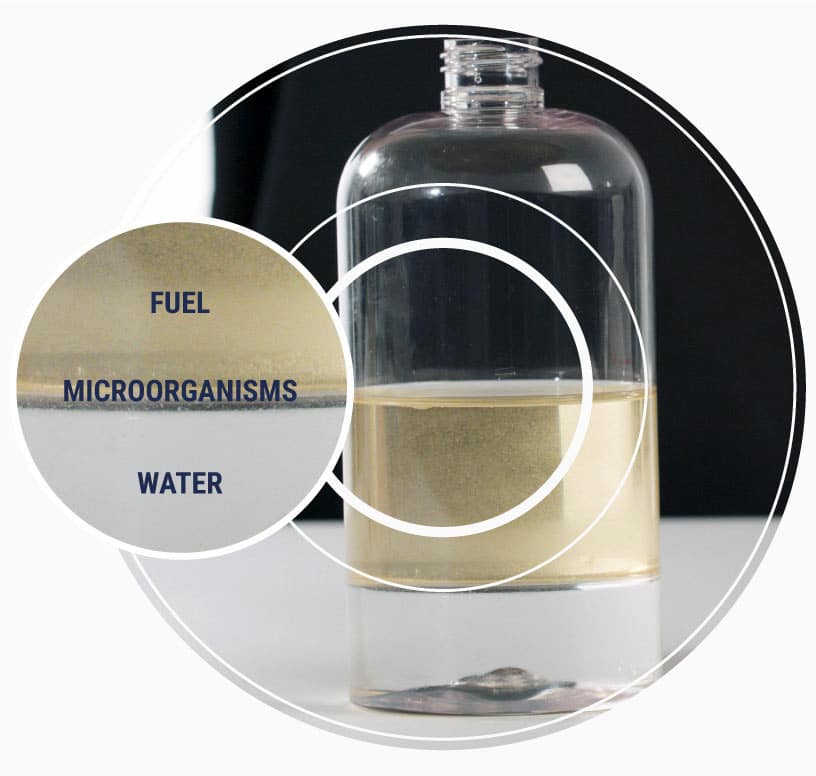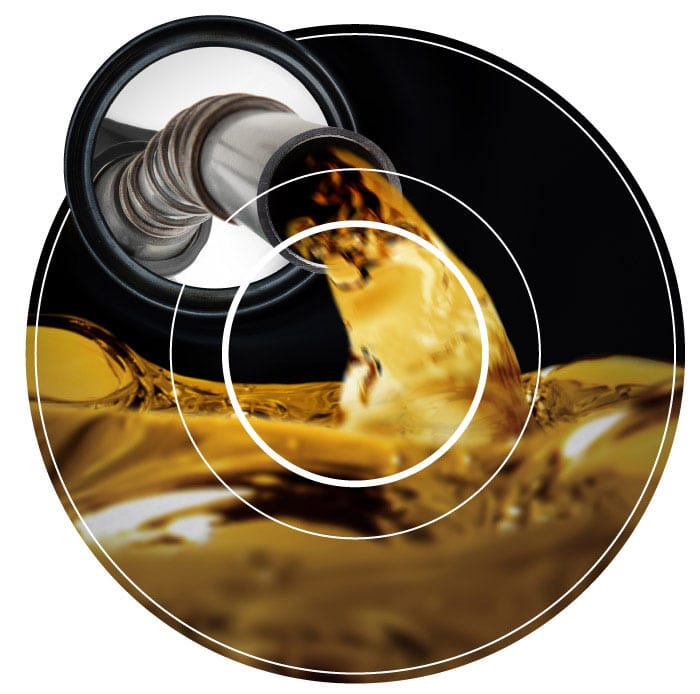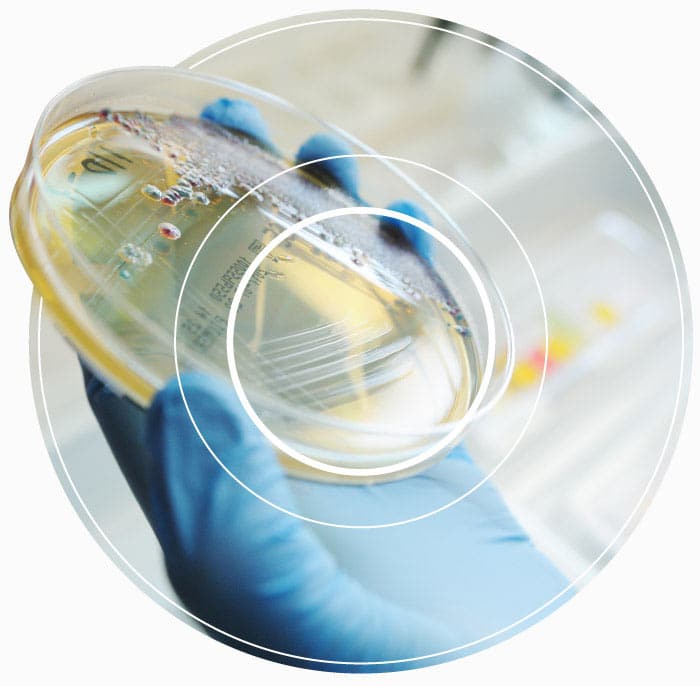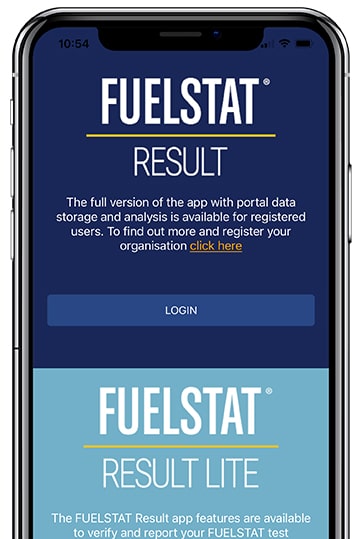How to get a diesel fuel contamination testing kit
If so, a diesel fuel bug contamination test kit can help you avoid costly operational problems by detecting fuel contamination early. Visit our main site to order a diesel fuel tester kit today.

Why do companies use microbiological contamination testing kits?
It occurs when certain species of bacteria, yeasts, and fungi survive in, grow and impact negatively diesel fuel systems. Regular testing can detect fuel contamination early, so the fuel can be treated, relatively inexpensively, before further mechanical or operations problems occur.
Microbiological contamination is also known as diesel bug or diesel algae, although technically it has nothing to do with algae itself.
Get FUELSTAT® Diesel Plus – FMD8 - Fuel Test Kit
The 15-minute fuel test used in over 130 countries.
Why is microbiological contamination a problem for diesel fuel users?
The microbial species that can live in the harsh environment of fuel systems gain their nourishment from the fuel hydrocarbons and water present. Microbes can happily grow even if there are small amounts of water present.
Water can enter fuel systems in many ways. The main source is often condensation, which can enter the tank or the fuel supply chain at almost any point. Getting rid of this water is a very important part of effectively managing diesel fuel contamination, but it’s very difficult to eliminate all water.
Because it’s so hard to eliminate water, fuel owners need to constantly monitor and manage the risks of diesel fuel microbiological contamination.
Organisations that use diesel fuel can proactively monitor for diesel fuel contamination with a range of tests that are done in laboratories. In addition, there are a few on-site tests for diesel fuel contamination available.

What are the consequences of diesel fuel microbial contamination?
This includes those who use diesel fuel in a land or marine engines, or who use diesel to power generators. Left unchecked, microorganisms can develop biofilms and biomass, and produce acids, which can result in:
Blocked filters and injectors
Gauging problems (instruments giving the wrong readings)
Degradation of fuel components
Increased fuel usage
Mechanical problems
Engine malfunctions
Leaking tank structures
Corroded fuel systems
These problems cause serious operational issues, like delays or assets being taken out of operation. In addition, the fuel itself becomes unusable. For large companies that store or move thousands of litres of fuel, the costs can add up to millions.
Read More >> Marine Fuel Testing // Aviation Fuel Testing
An example of how microbial contamination affects backup power generators
Some of the microbial burdens may end up at the bottom of the tank, so the generator works during testing, as it is drawing fuel from the top of the tank. However, upon refuelling, the biomass may be disturbed and thus clog up filters.
This issue can result in an increased risk of the generator not working. If the generator doesn’t start, there can be serious repercussions—when backup generators are installed for a data farm or a hospital, it’s obviously vital that they startup.
Read more >> Diesel Generator Fuel Testing
FUELSTAT® diesel fuel contamination testing kit
The 15-minute fuel test used in over 130 countries.



How is fuel contamination dealt with at its different levels?
In the early stages, an application of biocide may be enough to keep diesel fuel microbial contamination from causing more issues.
However, the application of biocides is costly and difficult from a health and safety viewpoint, and from an environmental one. In addition, biocide overuse may lead to resistant microbial species, resulting in ineffective treatment.
With heavy contamination, you may need to conduct tank cleaning and have the fuel reinstated. The latter procedure is done through a treatment called fuel polishing, which requires assistance from specialist companies. In some cases, the diesel fuel may be written off completely, which could be extremely expensive and cause serious disruption to your service and reputation.
In severe cases, the acids produced by microbial metabolism may cause corrosion. This means there is a possibility for the tank or pipeline contents to spill onto the earth.
When this happens, you would risk not only losing the fuel but also causing a serious environmental issue. You would almost certainly have to involve specialist environment cleaning companies, and in some cases, government agencies involved in environmental pollution.
How do I prevent diesel fuel microbial contamination from becoming a problem?
The important thing is to make sure they don’t reach dangerous levels and form corrosive acids. There are two keyways to do this, alongside making sure the tanks, vessels or equipment that holds the fuel is maintained regularly:
Regular water draining.
Even a single drop of water can help microbial contamination to grow quickly, so you should remove water from your fuel frequently.
Test your fuel for contamination.
Fuel tests can be done fairly easily, and the cost is insignificant compared with what a serious case of contamination would cost you.
It’s worth noting that you need to choose a testing method that reduces the risks of misleading results. If your test results falsely show that you have a contamination problem, you may spend a lot of money treating your fuel, tanks and pipelines when it isn’t necessary. This will be explained later.
FUELSTAT® Diesel Plus – FMD8 fuel test kit
The 15-minute fuel test used in over 130 countries.
What type of diesel microbial contamination tests are available?
Contamination can expand relatively quickly, especially in more hot and humid climates or seasons. It’s therefore sensible to try and detect growth at its earliest stage before it gets a chance to do damage.
Early-stage symptoms of contamination can often be treated with relatively cheap and simple measures, whereas heavier contamination problems can be far more serious and costly.
There are 3 main types of diesel fuel microbial contamination tests that you could choose from:
CFU (colony forming units) tests use a fuel sample to grow any culturable microorganisms present in it, under suitable conditions for growth (e.g. using appropriate growth media and an incubator).
ATP (adenosine triphosphate) tests involve quantification of the total ATP present in the sample by measuring the light emitted as a result of an enzymatic (luciferase) reaction, which indirectly indicates microbial presence.
Immunoassay antibody tests don’t test for the presence of all microbial species but instead, focus on the specific microbes that are known to cause damage to fuel systems.
Which diesel microbial contamination test should you use?
01.
CFU growth tests
These are very common tests that are available globally from laboratories that test fuel.
Unlike some other methods, CFU tests do not specifically look for microbes that are dangerous to fuel systems. They test for the total microbial presence in a sample, so the result may include general microbes that do not pose an immediate risk to diesel fuel.
Laboratories may not be located near to where the fuel sample was taken, in which case the fuel has to be transported. Fuel is a hazardous good, so the costs of transporting it are high. In addition, transporting fuel offsite means increased chances of misleading test results. This is because microbes can enter the samples, multiply, enter a dormancy period or even die during the journey—meaning the fuel samples do not accurately reflect what’s in the tank.
02.
ATP testing
However, it requires an expensive piece of equipment called a luminometer in order to conduct a test. The diesel fuel tester also requires a certain amount of training and experience to achieve reliable results.
Similar to CFU, ATP testing looks for total microbiological presence, not just the microbes that do damage in fuel systems. Because of this broad testing scope, misleading results are possible.
ATP testing is usually conducted at a different location to where the fuel is being stored or used. There is a risk of exogenous microorganisms or other living cells entering the sample during the sampling, handling or transport phases. This can lead to misleading results, where the obtained signal from living cells is not directly reflecting the actual number of microbes present in the tanks.
03.
Immunoassay antibody tests
There are no special requirements or equipment, and testers only need minimal training. Accordingly, immunoassay antibody tests are a particularly good option for testing in remote or offshore locations.
An immunoassay diesel fuel microbial contamination test kit only looks for microbes that are known to damage fuel systems. The major advantage is that immunoassay antibody tests are very simple to run, and little can go wrong. Additionally, they are performed on-site, thus avoiding the costs, control measures and delays of transportation.
Get FUELSTAT® Diesel Plus – FMD8 - Fuel Test Kit
Wondering where to buy a diesel fuel test kit for microbe detection? Visit our site now to get more information.
FUELSTAT® Diesel Plus – FMD8: the fast, easy test kit
Convenient on-site testing
FUELSTAT® works in on-site conditions and requires no special equipment, so there’s no need to send fuel samples to a sterile lab.
Easy to use
No laboratory or scientific expertise is required, and the tests can be conducted by anyone with minimal training, which is provided by Conidia Bioscience.
Digitally recorded results
Scan your FUELSTAT® diesel fuel testing kits using our handy app to record your results digitally for easy future reference.
Designed for fuel users
FUELSTAT® only looks for microbes that are dangerous to fuel, so there’s virtually no chance of misleading results.
FUELSTAT® diesel test kits are used in over 100 countries, by some of the world’s most recognised brands. The technology has been independently verified as complying with International Standard ASTM D8070.


